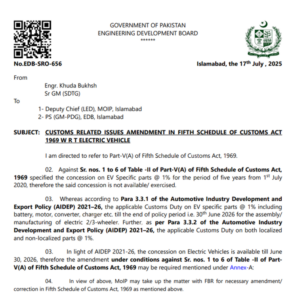Electric Bike Prices in Pakistan May Increase Massively
Picture this: Assembly lines humming with EV bike parts — from batteries to converters — that used to enjoy a sweet 1% import duty. Now, that tiny tax may balloon to a hefty 30–35%.
The Engineering Development Board (EDB) recently asked the federal government to continue its tax exemptions on EV bike parts. But their request didn’t make the grade. And so, customs duty on these crucial components could rise sharply—from just 1% up to 30–35%.
The perks began on July 1, 2020, and were part of the broader Auto Industry Development Policy 2021–26 (till the end of the policy period, i.e., 30 June 2026). Exemptions covered batteries, motors, chargers, and converters—clearly designed to help seed the EV bike market.

The Extension Request, meant to be lodged before the federal budget, apparently wasn’t. Now EDB and manufacturers are bracing for the fallout.
To investigate the matter, we contacted EDB officials, and they have confirmed the update.
What This Means for E-Bikes—and Consumers
- Prices are going up: Higher duty on components directly raises manufacturing costs. Unless passed on entirely to consumers, businesses will see squeezed profit margins—good luck keeping prices low, then.
- Acceleration may stall: EV bike growth has relied on incentivized pricing. This duty hike could slow adoption, especially in price-sensitive segments such as college students or urban commuters.
- Earlier support may slip away: Previously, there were financing packages, quotas for women, and other incentives in place to swing interest. But without affordable components, these may prove insufficient.
Looking Back — What Incentives Enabled
The 2019 National EV Policy set ambitious goals—50% of two- and three-wheelers electrified by 2030 and 90% by 2040—plus low import duties and tax savings to boost affordability.
By June 2025, Pakistan rolled out a new EV Policy (2025–30), including Rs 100 billion (~$353M) in subsidies for electric bikes and rickshaws, aimed to slash fuel costs and CO₂ emissions.
Pakistan’s electric-bike revolution stands at a crossroads. On one hand, visionary policies, subsidies, and growing consumer interest laid a strong groundwork. On the other hand, the sudden swing to high import duties threatens to slow momentum—unless stakeholders act swiftly.
The next few months will be crucial: will the government reverse course, and will the EDB regain its footing to lead decisively? For now, one thing’s certain—EV bike pricing and uptake are on uncertain ground, with big stakes for the environment, industry, and everyday riders.


